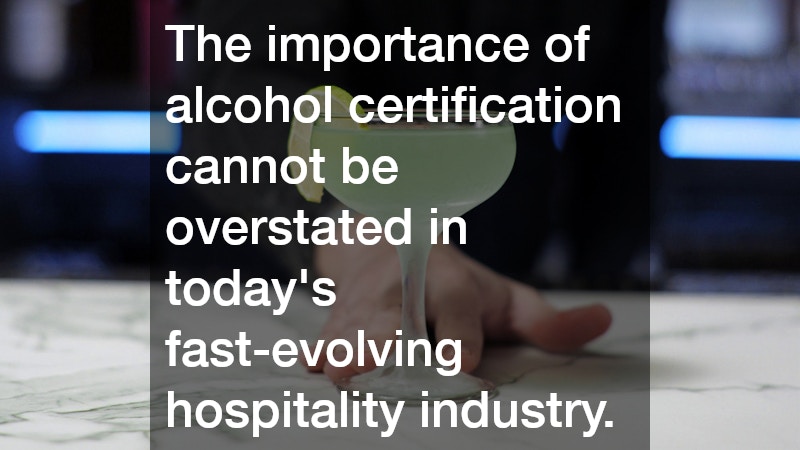In today’s food and beverage industry, understanding the significance of alcohol certification is increasingly important. Businesses and individuals alike benefit from the assurance and reliability these certifications offer. They are not only a legal necessity but also a mark of professionalism and knowledge. As consumer expectations rise, the responsibility falls on establishments and individuals to ensure safe and responsible alcohol service.
This article explores the various facets of alcohol certification and why it has become essential in today’s society.
The Importance of Alcohol Certification
Alcohol certification serves as a foundational pillar of responsibility for any business that serves alcoholic beverages. It ensures that all personnel involved in the sale and service of alcohol are educated in responsible serving practices. This certification helps in mitigating the risks associated with alcohol consumption, reducing liability for businesses, and enhancing consumer safety. In many regions, alcohol certification is a legal requirement, underscoring its importance in regulatory compliance. Beyond legality, it represents a commitment to upholding high standards in service and customer care.
The knowledge gained through alcohol certification is invaluable in preventing common issues such as over-serving and underage drinking. Bartenders and servers are trained to recognize signs of intoxication and effectively manage potentially problematic situations. Such training empowers staff to make informed decisions, contributing to a safer, more enjoyable environment. Additionally, alcohol certifications frequently include education on local laws and regulations, which vary greatly and are essential for legal compliance. This comprehensive understanding positions businesses as responsible and reliable entities.
The Legal and Economic Relevance
Legal compliance is a major driving force behind the necessity of alcohol certification. Many jurisdictions have strict laws that require staff serving alcohol to hold valid certifications. This mandatory compliance helps avert potential legal battles and the negative financial repercussions that may arise from misconduct or non-compliance. Furthermore, adherence to these regulations safeguards a business’s operational license, preventing costly shutdowns or fines. Alcohol certification is thus an essential investment in ensuring both legal protection and business longevity.
From an economic perspective, alcohol certification contributes to the sustainability and financial success of businesses. By promoting responsible serving and reducing over-consumption, businesses can decrease their liability and potential insurance claims. Moreover, establishments with certified staff often experience enhanced customer satisfaction, leading to increased patronage and higher revenue. Customers are more likely to frequent venues where they feel safe, understood, and well-cared for, thereby boosting a business’s reputation and clientele in the long run.
In addition to its direct economic impacts, alcohol certification can also influence the broader market dynamics of the alcohol and hospitality industries. Certified establishments set standards that others strive to reach, promoting an overall elevating effect within the industry. With rising competition, the pressure to maintain high standards through certification becomes even more pronounced. Thus, alcohol certification is not only a regulatory necessity but a competitive advantage in today’s market. It reflects a proactive approach to market demands, fostering trust and loyalty among consumers.
The Training Process and Best Practices
The process of obtaining alcohol certification involves comprehensive training that covers a wide range of topics essential for responsible alcohol service. Participants learn about the effects of alcohol on the body, recognizing the signs of intoxication, and techniques for managing difficult situations. This training is crucial for developing skills that ensure customer safety and satisfaction. Additionally, certified training programs emphasize adherence to local and national laws, a critical aspect of responsible alcohol service. These detailed training sessions equip staff with knowledge to confidently handle alcohol service in varied environments.
Best practice guidelines provided during certification training focus on real-world application, preparing individuals for common scenarios faced in the field. Role-playing exercises and case studies are often used to simulate situations that may arise during service. This hands-on approach helps participants apply theoretical knowledge practically, enhancing their problem-solving skills and confidence. Through these exercises, staff refine their ability to maintain composure and professionalism under challenging circumstances. Ultimately, they become adept at balancing customer service with regulatory compliance and responsibility.
The importance of alcohol certification cannot be overstated in today’s fast-evolving hospitality industry. This certification ensures that individuals are well-equipped to serve alcohol responsibly, safeguarding both businesses and patrons from potential harm. By emphasizing the legal, economic, and educational aspects of alcohol certification, establishments set themselves up for sustained success and viability. The undeniable benefits, ranging from legal compliance to enhanced safety and service quality, make alcohol certification a wise investment for all stakeholders. Pouring with confidence is a realistic goal, achieved through the credibility and respect that alcohol certification brings.


